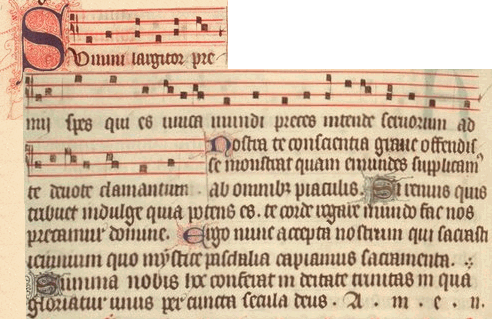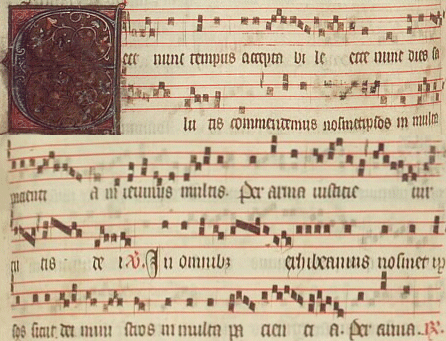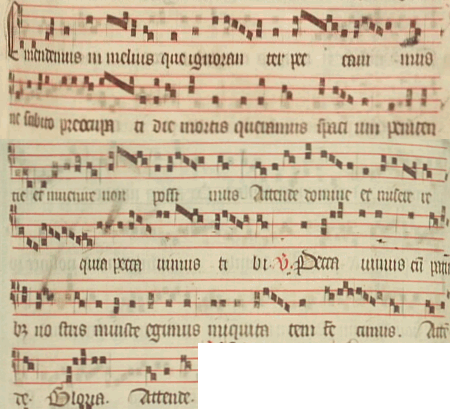READINGS: LENT MONDAY III
ἤγγικεν ἡ βασιλεία τοῦ θεοῦ: — μετανοεῖτε καὶ πιστεύετε ἐν τῷ εὐαγγελίῳ.
Even Years: Exodus 24:1-18
וְאֶל־מֹשֶׁה
אָמַר עֲלֵה
אֶל־יְהוָה
אַתָּה וְאַהֲרֹן
נָדָב
וַאֲבִיהוּא
וְשִׁבְעִים מִזִּקְנֵי
יִשְׂרָאֵל
וְהִשְׁתַּחֲוִיתֶם
מֵרָחֹק׃ וְנִגַּשׁ
מֹשֶׁה
לְבַדּוֹ
אֶל־יְהוָה
וְהֵם לֹא
יִגָּשׁוּ
וְהָעָם לֹא
יַעֲלוּ עִמּוֹ׃
וַיָּבֹא
מֹשֶׁה
וַיְסַפֵּר
לָעָם אֵת כָּל־דִּבְרֵי
יְהוָה וְאֵת
כָּל־הַמִּשְׁפָּטִים
וַיַּעַן
כָּל־הָעָם
קוֹל אֶחָד וַיֹּאמְרוּ
כָּל־הַדְּבָרִים
אֲשֶׁר־דִּבֶּר
יְהוָה
נַעֲשֶׂה׃ וַיִּכְתֹּב
מֹשֶׁה אֵת
כָּל־דִּבְרֵי
יְהוָה
וַיַּשְׁכֵּם
בַּבֹּקֶר
וַיִּבֶן מִזְבֵּחַ
תַּחַת הָהָר
וּשְׁתֵּים
עֶשְׂרֵה
מַצֵּבָה
לִשְׁנֵים
עָשָׂר
שִׁבְטֵי יִשְׂרָאֵל׃
וַיִּשְׁלַח
אֶת־נַעֲרֵי
בְּנֵי
יִשְׂרָאֵל
וַיַּעֲלוּ
עֹלֹת
וַיִּזְבְּחוּ
זְבָחִים
שְׁלָמִים
לַיהוָה
פָּרִים׃ וַיִּקַּח
מֹשֶׁה חֲצִי
הַדָּם
וַיָּשֶׂם בָּאַגָּנֹת
וַחֲצִי
הַדָּם זָרַק
עַל־הַמִּזְבֵּחַ׃ וַיִּקַּח
סֵפֶר
הַבְּרִית
וַיִּקְרָא
בְּאָזְנֵי
הָעָם
וַיֹּאמְרוּ
כֹּל אֲשֶׁר־דִּבֶּר
יְהוָה
נַעֲשֶׂה
וְנִשְׁמָע׃ וַיִּקַּח
מֹשֶׁה
אֶת־הַדָּם
וַיִּזְרֹק עַל־הָעָם
וַיֹּאמֶר
הִנֵּה
דַם־הַבְּרִית
אֲשֶׁר
כָּרַת
יְהוָה
עִמָּכֶם עַל
כָּל־הַדְּבָרִים
הָאֵלֶּה׃
וַיַּעַל
מֹשֶׁה
וְאַהֲרֹן
נָדָב
וַאֲבִיהוּא
וְשִׁבְעִים
מִזִּקְנֵי
יִשְׂרָאֵל׃ וַיִּרְאוּ
אֵת אֱלֹהֵי
יִשְׂרָאֵל
וְתַחַת
רַגְלָיו
כְּמַעֲשֵׂה
לִבְנַת
הַסַּפִּיר
וּכְעֶצֶם
הַשָּׁמַיִם
לָטֹהַר׃ וְאֶל־אֲצִילֵי
בְּנֵי
יִשְׂרָאֵל
לֹא שָׁלַח
יָדוֹ וַיֶּחֱזוּ
אֶת־הָאֱלֹהִים
וַיֹּאכְלוּ
וַיִּשְׁתּוּ׃
וַיֹּאמֶר
יְהוָה
אֶל־מֹשֶׁה
עֲלֵה אֵלַי הָהָרָה
וֶהְיֵה־שָׁם
וְאֶתְּנָה
לְךָ אֶת־לֻחֹת
הָאֶבֶן
וְהַתּוֹרָה
וְהַמִּצְוָה
אֲשֶׁר
כָּתַבְתִּי
לְהוֹרֹתָם׃ וַיָּקָם
מֹשֶׁה
וִיהוֹשֻׁעַ
מְשָׁרְתוֹ וַיַּעַל
מֹשֶׁה
אֶל־הַר
הָאֱלֹהִים׃ וְאֶל־הַזְּקֵנִים
אָמַר
שְׁבוּ־לָנוּ
בָזֶה עַד
אֲשֶׁר־נָשׁוּב
אֲלֵיכֶם
וְהִנֵּה
אַהֲרֹן
וְחוּר
עִמָּכֶם
מִי־בַעַל
דְּבָרִים
יִגַּשׁ
אֲלֵהֶם׃
וַיַּעַל
מֹשֶׁה
אֶל־הָהָר
וַיְכַס
הֶעָנָן
אֶת־הָהָר׃ וַיִּשְׁכֹּן
כְּבוֹד־יְהוָה
עַל־הַר
סִינַי
וַיְכַסֵּהוּ
הֶעָנָן שֵׁשֶׁת
יָמִים
וַיִּקְרָא
אֶל־מֹשֶׁה
בַּיּוֹם
הַשְּׁבִיעִי
מִתּוֹךְ
הֶעָנָן׃ וּמַרְאֵה
כְּבוֹד
יְהוָה
כְּאֵשׁ
אֹכֶלֶת
בְּרֹאשׁ
הָהָר
לְעֵינֵי
בְּנֵי
יִשְׂרָאֵל׃ וַיָּבֹא
מֹשֶׁה
בְּתוֹךְ
הֶעָנָן
וַיַּעַל
אֶל־הָהָר וַיְהִי
מֹשֶׁה
בָּהָר
אַרְבָּעִים
יוֹם
וְאַרְבָּעִים
לָיְלָה׃
3 Moses went and told the people all Yahweh's words and all the laws, and all the people answered with one voice, 'All the words Yahweh has spoken we will carry out!' 4 Moses put all Yahweh's words into writing, and early next morning he built an altar at the foot of the mountain, with twelve standing-stones for the twelve tribes of Israel.
5 Then he sent certain young Israelites to offer burnt offerings and sacrifice bullocks to Yahweh as communion sacrifices. 6 Moses then took half the blood and put it into basins, and the other half he sprinkled on the altar. 7 Then, taking the Book of the Covenant, he read it to the listening people, who then said, 'We shall do everything that Yahweh has said; we shall obey.' 8 Moses then took the blood and sprinkled it over the people, saying, 'This is the blood of the covenant which Yahweh has made with you, entailing all these stipulations.'
9 Moses, Aaron, Nadab, Abihu and seventy elders of Israel then went up, 10 and they saw the God of Israel beneath whose feet there was what looked like a sapphire pavement pure as the heavens themselves, 11 but he did no harm to the Israelite notables; they actually gazed on God and then ate and drank.
12 Yahweh said to Moses, 'Come up to me on the mountain. Stay there, and I will give you the stone tablets —the law and the commandment— which I have written for their instruction.' 13 Moses made ready, with Joshua his assistant, and they went up the mountain of God. 14 He said to the elders, 'Wait here for us until we come back to you. You have Aaron and Hur with you; if anyone has any matter to settle, let him go to them.'
15 Moses then went up the mountain. Cloud covered the mountain. 16 The glory of Yahweh rested on Mount Sinai and the cloud covered it for six days. On the seventh day Yahweh called to Moses from inside the cloud. 17 To the watching Israelites, the glory of Yahweh looked like a devouring fire on the mountain top. 18 Moses went right into the cloud and went on up the mountain. Moses stayed on the mountain for forty days and forty nights.
Odd Years: Hebrews 2:1-18
διὰ
τοῦτο δεῖ
περισσοτέρως
προσέχειν
ἡμᾶς τοῖς
ἀκουσθεῖσιν,
μήποτε
παραρυῶμεν.
Even Years: Augustine of Hippo, Sermon 205, for Lent
Odd Years: John Fisher, Commentary on Psalm 129
Cryste Ihesu is our bysshop, his moost precyous body is or sacrefyce, whiche he offred vpon a crosse for the redempcyon of all the worlde. The blode shedde for our redempcyon was not the blode of gotes or calues as in the olde law, it was the very blode moost innocent of our sauyour Ihesu cryste.
The temple wherin our bysshop dyde sacrefyce was not made by mannes hande but onely by the power of god, he shedde his precyous blode for our redempcion in the face of all the worlde, whiche is the temple made onely by the hande of god.
This temple hath two dyuers partes, one is the erth wheron we be inhabyte, the other is not yet knowen to vs mortall creatures.
Fyrst he dyde sacrefyce in the erth whan he suffred his passyon. After in a newe clothynge or garment, the vesture of immortalite, & with his owne precyous blode entred in to sancta sanctorum, that is to saye in to heuen where he shewed his sayd moost precyous blode before the trone of his fader whiche he shedde for all synners .vij. tymes.
By this holy sacrefyce almyghty god must nedes haue pyte & execute his mercy to al true penytentes & this sacrefyce shall euer contynue not onely yere by yere as the maner was of Iewes, but also it is dayly offred for our comforte, and euery houre & moment for our moost stronge socour, wherfore saynt Paule sayth. Eterna redemptione inuenta. By it we be redemed for euer.
Euery contryte & true penytent persone not wyllynge to fall agayne but with a full purpose contynue in vertuous lyuynge, is parte taker of this holy sacrefyce. As saynt Iohan sheweth in his fyrst epystle. Filioli me hec scribo vobis vt non peccetis, sed & si quis peccauerit aduocatum habeamus apud patrem iesum christum iustum, et ipse est propiciatio pro peccatis nostris, non pro nostris tantum sed & totius mundi.

Invitatory Psalm & BACK

PSALMS and BACK
1 He then said to Moses, 'Come up to Yahweh, you and Aaron, Nadab and Abihu, and seventy of the elders of Israel and bow down at a distance. 2 Moses alone will approach Yahweh; the others will not approach, nor will the people come up with him.'
εἰ
γὰρ ὁ δι'
ἀγγέλων
λαληθεὶς
λόγος ἐγένετο
βέβαιος,
καὶ
πᾶσα
παράβασις καὶ
παρακοὴ
ἔλαβεν
ἔνδικον μισθαποδοσίαν,
πῶς
ἡμεῖς
ἐκφευξόμεθα
τηλικαύτης
ἀμελήσαντες σωτηρίας;
ἥτις,
ἀρχὴν λαβοῦσα
λαλεῖσθαι διὰ
τοῦ κυρίου,
ὑπὸ
τῶν
ἀκουσάντων
εἰς ἡμᾶς
ἐβεβαιώθη,
συνεπιμαρτυροῦντος
τοῦ θεοῦ
σημείοις τε
καὶ τέρασιν
καὶ
ποικίλαις
δυνάμεσιν καὶ
πνεύματος
ἁγίου μερισμοῖς
κατὰ τὴν αὐτοῦ
θέλησιν.
οὐ
γὰρ ἀγγέλοις
ὑπέταξεν τὴν
οἰκουμένην
τὴν μέλλουσαν,
περὶ ἧς
λαλοῦμεν.
διεμαρτύρατο
δέ πού τις
λέγων,
τί
ἐστιν
ἄνθρωπος ὅτι
μιμνῄσκῃ
αὐτοῦ,
ἢ
υἱὸς ἀνθρώπου
ὅτι ἐπισκέπτῃ
αὐτόν;
ἠλάττωσας
αὐτὸν βραχύ τι
παρ' ἀγγέλους,
δόξῃ
καὶ τιμῇ
ἐστεφάνωσας
αὐτόν,
πάντα
ὑπέταξας
ὑποκάτω τῶν
ποδῶν αὐτοῦ.
ἐν τῷ
γὰρ ὑποτάξαι
αὐτῷ τὰ πάντα
οὐδὲν ἀφῆκεν
αὐτῷ ἀνυπότακτον.
νῦν
δὲ οὔπω ὁρῶμεν
αὐτῷ τὰ πάντα
ὑποτεταγμένα:
τὸν
δὲ βραχύ τι παρ'
ἀγγέλους
ἠλαττωμένον
βλέπομεν
Ἰησοῦν διὰ τὸ
πάθημα τοῦ
θανάτου δόξῃ
καὶ τιμῇ ἐστεφανωμένον,
ὅπως
χάριτι θεοῦ
ὑπὲρ παντὸς
γεύσηται
θανάτου.
ἔπρεπεν
γὰρ αὐτῷ, δι' ὃν
τὰ πάντα καὶ δι'
οὗ τὰ πάντα,
πολλοὺς
υἱοὺς εἰς
δόξαν
ἀγαγόντα
τὸν
ἀρχηγὸν τῆς
σωτηρίας
αὐτῶν διὰ
παθημάτων τελειῶσαι.
ὁ τε
γὰρ ἁγιάζων
καὶ οἱ
ἁγιαζόμενοι
ἐξ ἑνὸς πάντες:
δι' ἣν
αἰτίαν οὐκ
ἐπαισχύνεται
ἀδελφοὺς
αὐτοὺς καλεῖν,
λέγων,
ἀπαγγελῶ
τὸ ὄνομά σου
τοῖς ἀδελφοῖς
μου, ἐν μέσῳ
ἐκκλησίας
ὑμνήσω σε:
καὶ
πάλιν, ἐγὼ
ἔσομαι
πεποιθὼς ἐπ'
αὐτῷ:
καὶ
πάλιν, ἰδοὺ
ἐγὼ καὶ τὰ
παιδία ἅ μοι
ἔδωκεν ὁ θεός.
ἐπεὶ
οὖν τὰ παιδία
κεκοινώνηκεν
αἵματος καὶ
σαρκός,
καὶ
αὐτὸς
παραπλησίως
μετέσχεν τῶν
αὐτῶν,
ἵνα
διὰ τοῦ
θανάτου
καταργήσῃ τὸν
τὸ κράτος
ἔχοντα τοῦ
θανάτου,
τοῦτ'
ἔστιν τὸν
διάβολον,
καὶ
ἀπαλλάξῃ
τούτους,
ὅσοι
φόβῳ θανάτου
διὰ παντὸς τοῦ
ζῆν ἔνοχοι ἦσαν
δουλείας.
οὐ γὰρ
δήπου ἀγγέλων
ἐπιλαμβάνεται,
ἀλλὰ
σπέρματος Ἀβραὰμ
ἐπιλαμβάνεται.
ὅθεν
ὤφειλεν κατὰ
πάντα τοῖς
ἀδελφοῖς
ὁμοιωθῆναι,
ἵνα
ἐλεήμων
γένηται καὶ
πιστὸς
ἀρχιερεὺς τὰ
πρὸς τὸν θεόν,
εἰς
τὸ ἱλάσκεσθαι
τὰς ἁμαρτίας
τοῦ λαοῦ:
ἐν ᾧ
γὰρ πέπονθεν
αὐτὸς πειρασθείς,
δύναται
τοῖς
πειραζομένοις
βοηθῆσαι.
1 We ought, then, to turn our minds more attentively than before to what we have been taught, so that we do not drift away. 2 If a message that was spoken through angels proved to be so reliable that every infringement and disobedience brought its own proper punishment, 3 then we shall certainly not go unpunished if we neglect such a great salvation. It was first announced by the Lord himself, and is guaranteed to us by those who heard him; 4 God himself confirmed their witness with signs and marvels and miracles of all kinds, and by distributing the gifts of the Holy Spirit in the various ways he wills. 5 It was not under angels that he put the world to come, about which we are speaking. 6 Someone witnesses to this somewhere with the words: What are human beings that you spare a thought for them, a child of Adam that you care for him? 7 For a short while you have made him less than the angels; you have crowned him with glory and honour, 8 put all things under his feet. For in putting all things under him he made no exceptions. At present, it is true, we are not able to see that all things are under him, 9 but we do see Jesus, who was for a short while made less than the angels, now crowned with glory and honour because he submitted to death; so that by God's grace his experience of death should benefit all humanity. 10 It was fitting that God, for whom and through whom everything exists, should, in bringing many sons to glory, make perfect through suffering the leader of their salvation. 11 For consecrator and consecrated are all of the same stock; that is why he is not ashamed to call them brothers 12 in the text: I shall proclaim your name to my brothers, praise you in full assembly; or in the text: 13 I shall put my hope in him; followed by Look, I and the children whom God has given me. 14 Since all the children share the same human nature, he too shared equally in it, so that by his death he could set aside him who held the power of death, namely the devil, 15 and set free all those who had been held in slavery all their lives by the fear of death. 16 For it was not the angels that he took to himself; he took to himself the line of Abraham. 17 It was essential that he should in this way be made completely like his brothers so that he could become a compassionate and trustworthy high priest for their relationship to God, able to expiate the sins of the people. 18 For the suffering he himself passed through while being put to the test enables him to help others when they are being put to the test.
Obseruationem quadragesimae, solemni reditu praesentatam, hodierno die ingredimur: quo uobis solemniter etiam exhortatio nostra debetur; ut dei sermo per nostrum officium ministratus, ieiunaturos corpore, pascat in corde; ac sic interior homo cibo suo refectus, exterioris castigationem possit agere, et robustius sustinere. congruit enim nostrae deuotioni, ut qui domini crucifixi passionem iam propinquantem celebraturi sumus, reprimendarum carnalium uoluptatum crucem nobis ipsi etiam faciamus, sicut dicit apostolus: qui autem iesu christi sunt, carnem suam crucifixerunt cum passionibus et concupiscentiis.
As we begin our annual Lenten observance with its solemn call to conversion, it is incumbent upon me to make the customary solemn exhortation to all of you. Indeed, it is more than ever my pastoral duty to nourish your minds with the word of God when you are about to mortify your bodies by fasting, for once you have been inwardly refreshed by the food of the spirit you will be able to undertake physical hardships more courageously and endure them with greater stamina.
We are soon to celebrate the Passion of our crucified Lord. It is therefore in keeping with our commitment to him that we should crucify ourselves by restraining the desires of the flesh. As the Apostle says: You cannot belong to Christ Jesus unless you crucify all your self-indulgent passions and desires.
In hac quidem cruce, per totam istam uitam, quae in mediis tentationibus ducitur, perpetuo debet pendere
christianus. non enim est in hac uita tempus euellendi clauos, de quibus in
psalmo dicitur: confige clauis a timore tuo carnes meas. carnes, sunt
carnales concupiscentiae; claui, sunt praecepta iustitiae: his illas timor
domini configit, qui nos illi acceptabilem hostiam crucifigit. unde item dicit
apostolus: obsecro itaque uos, fratres, per miserationem dei, ut exhibeatis
corpora uestra hostiam uiuam, sanctam, deo placentem. crux ergo ista, in qua
dei seruus non solum non confunditur, sed etiam gloriatur dicens, mihi autem
absit gloriari, nisi in cruce domini nostri iesu christi, per quem mihi mundus
crucifixus est, et ego mundo.
Such is the Cross upon which we Christians must continually hang, since our whole lives are beset by trials and temptations. Not for us, as long as we live, to be rid of those nails we read of in the psalm: Pierce my flesh with the nails of your fear. Flesh means the desires of our lower nature; nails, the demands of God's justice and holiness. With these the fear of the Lord pierces our flesh and fastens us to the Cross as an acceptable sacrifice to him. In a similar passage the apostle Paul appeals to us by the mercy of God to offer our bodies as a living sacrifice, holy and acceptable to God.
To hang on such a Cross brings no shame to the servants of God; it is something in which they glory, as Saint Paul does when he says: Far be it from me to glory in anything except in the Cross of our Lord Jesus Christ, through whom the world has been crucified to me, and I to the world.
Crux, inquam, ista non quadraginta dierum est, sed totius huius uitae unde et moyses et elias et ipse dominus quadraginta diebus ieiunauerunt: ut insinuaretur nobis et in moyse et in elia et in ipso christo, hoc est, in lege et prophetis et in ipso euangelio, id
nobis cum agi, ne conformemur et haereamus huic saeculo, sed crucifigamus
hominem ueterem
This crucifixion, I repeat, is something that must continue throughout our life, not for forty days only. It is true that Moses, Elijah, and our Lord himself fasted for forty days; but in Moses, Elijah, and Christ we are meant to see the Law, the Prophets, and the Gospel, and to learn from them not to cling to this present world or imitate its ways, but to nail our unregenerate selves to the Cross.
sic semper hic uiue, christiane: si terreno limo gressus non uis immergere, noli de ista cruce descendere. si autem hoc faciendum est per hanc totam uitam, quanto magis per istos quadragesimae dies, quibus non solum agitur, uerum etiam significatur haec uita?
Christians must always live in this way, without any wish to come down from their Cross, otherwise they will sink beneath the world's mire. But if we have to do so all our lives, we must make an even greater effort during these days of Lent. It is not a simple matter of living through forty days; Lent is the epitome of our whole life.
Prayer

